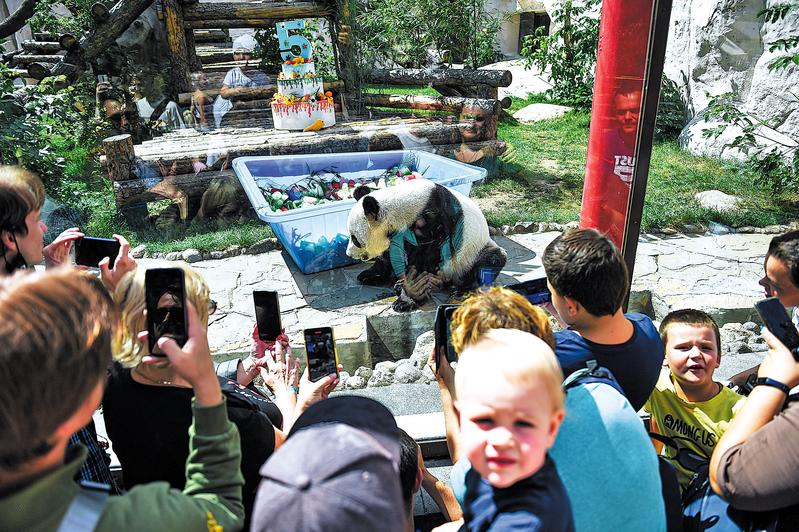Two nations to generate new momentum together in the long term
 Visitors watch giant pandas at the Moscow Zoo. (PHOTO / XINHUA)
Visitors watch giant pandas at the Moscow Zoo. (PHOTO / XINHUA)
The enhanced political trust and facilitation of practical trade measures between China and Russia will generate further growth momentum in the fields of high-tech cooperation, people-to-people exchanges and two-way investment in the long term, said experts from both countries.
While deepening mutual political trust and expanding the convergence of interests, China and Russia have leveraged their comparative strengths, further widened market access to each other, and jointly promoted high-quality growth in both countries, said Xu Hongcai, deputy director of the Economic Policy Commission with the China Association of Policy Science in Beijing.
Last year marked the 20th anniversary of the signing of the China-Russia Treaty of Good-Neighborliness and Friendly Cooperation. The two countries issued a joint statement that provided for the treaty to be extended in June 2021.
“Under such circumstances, the China-Russia comprehensive strategic partnership of coordination for a new era has established itself as an important diplomatic and strategic asset shared by both sides,” Xu said, adding it has also brought both countries closer together as they wrestle with all sorts of external challenges.
China has made great progress in scientific and technological innovation, but some critical issues remain, such as a limited capacity in original innovation, a low proportion of high-end scientific and technological output, and a lack of self-reliance in core industrial technologies, according to Gao Jixiang, deputy director of the Department of Russian Economics of the Institute of Russian, Eastern European and Central Asian Studies of the Chinese Academy of Social Sciences.
“There is a long way to go for Russia to catch up with the most advanced research in terms of cutting-edge technologies,” he said. “Therefore, China and Russia should leverage their respective strengths to explore a path of integrated innovation by improving the overarching design of the cooperation mechanism, and expanding cooperation in basic research.”
Gao suggested that both countries build a community of a shared future for science, technology and innovation cooperation in the coming years, and, in light of the limitations, jointly propose solutions to major challenges in the field of global technological innovation and development, Gao said.
His opinion is shared by Yelena B. Lenchuk, director of the Institute of Economics at the Russian Academy of Sciences. Lenchuk said a country needs new and advanced technology to enhance its competitiveness.
“In this regard, China and Russia could deepen cooperation to jointly tackle developmental challenges, especially because economic planning is conducive to rapid economic growth, in which China has valuable experience to share,” Lenchuk said.
China and Russia have their own advantages and characteristics in terms of resource endowments, levels of industrialization and economic systems.
The two economies enjoy strong complementarities and shared interests, as they present great prospects for practical cooperation in various fields, according to Ding Rijia, a professor specializing in energy economies at the China University of Mining and Technology in Beijing. Therefore, they should seize the historic opportunities brought by the new round of technological revolution to strengthen the complementarity of the Belt and Road Initiative and the Eurasian Economic Union, while also creating opportunities for cooperation in both traditional and new areas, he added.
China and Russia have proactively cultivated new growth drivers such as low-carbon transformation, cross-border e-commerce, bio-pharmaceutical industry and cultural creativity in recent years.
The two countries saw their cross-border e-commerce trade surge by 187 percent on a yearly basis in the first 11 months of 2021, according to China’s Ministry of Commerce.
With burgeoning demand for natural gas in the country, Hebei province-based ENN Group and Zhejiang Energy Group, two privately owned Chinese companies, secured gas imports from Russian energy company Novatek through long-term agreements on the supply of liquefied natural gas from the Arctic LNG 2 project in early January.
Arctic LNG 2 is Novatek’s second LNG project, which includes the construction of three LNG liquefaction trains of 6.6 million metric tons per year each for a total LNG capacity of 19.8 million tons, and cumulative gas condensate production capacity of 1.6 million tons annually, according to the Russian company.
The contract with Zhejiang Energy stipulates the supply of up to 1 million tons of LNG per year for 15 years.
The agreement with ENN Natural Gas involves the delivery of approximately 600,000 tons of LNG annually over a period of 11 years. The LNG will be delivered to the LNG terminals of the two companies in China.


